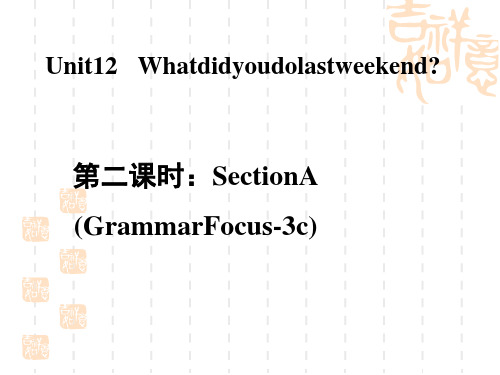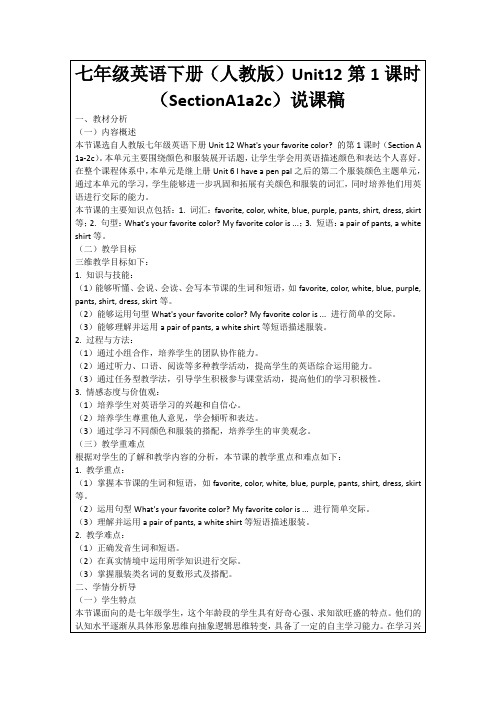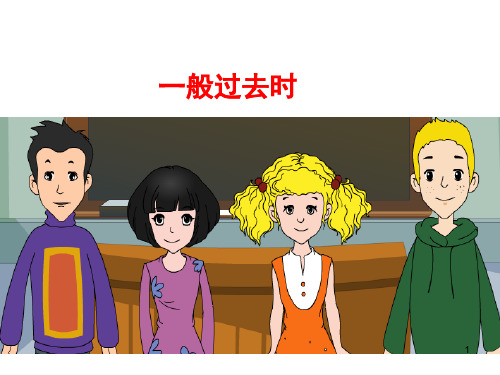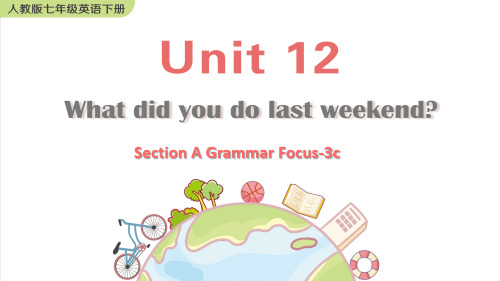初中英语人教版七年级下册unit12 sectionA
人教版七年级下册英语Unit 12 SectionA (Grammar Focus-3c)

问头
一般过去时
一般现在时
特殊疑问词
特 殊 疑 问
+was/ w+特ae殊drej.+疑+主问其语词他+?主 数 第语 时 三是 , 人第 谓 称三语单人动数称词形单用式。
句
did +主语+ 动词原形+其
他?
典例 YesterdayMom_____B___mesomemoneytobuyadictio nary. [扬州] A. givesB. gave C. hasgivenD. wasgiving
B
_______didyoustayinChangsha?
—Forthreedays. [湘西]
A. HowsoonB. HowlongC. Howfar
【点拨】用关键信息法解题。根据答语“Forthreedays.”可 知,问句询问“多长时间”。
主语 一般过去时和LeiisinterestedinEnglishandhe_____w__a_tc_hes (watch) BBCNewseveryday. [兰州]
一、单项选择
1.—___C__theylastyear?
—TheywereinAmerica.
A. Howwere
B. Howwas
C. Wherewere
知识点
2
FatherMouseshoutedatthecat, “Woof, woof!”
考点2 shout/ʃaʊt/v. 呼叫;喊叫 对……大声喊叫,无恶意,多因距离远
【重点】 辨析shoutat与shoutto
shout 冲……大声叫嚷,吼,非善意 at
shout 对……大声喊叫,无恶意,多 to 因距离远
七年级英语下册(人教版)Unit12第1课时(SectionA1a2c)说课稿

3.不断提高自身教学水平,学习新的教学理念和方法,以适应学生的需求。
(3)掌握服装类名词的复数形式及搭配。
二、学情分析导
(一)学生特点
本节课面向的是七年级学生,这个年龄段的学生具有好奇心强、求知欲旺盛的特点。他们的认知水平逐渐从具体形象思维向抽象逻辑思维转变,具备了一定的自主学习能力。在学习兴趣方面,学生对新鲜事物充满好奇,喜欢通过游戏、互动等形式学习英语。此外,学生在学习习惯上,已初步形成了合作、探究的学习方式,但仍有部分学生依赖性强,需要教师引导和督促。
(二)教学目标
三维教学目标如下:
1.知识与技能:
(1)能够听懂、会说、会读、会写本节课的生词和短语,如favorite, color, white, blue, purple, pants, shirt, dress, skirt等。
(2)能够运用句型What's your favorite color? My favorite color is ...进行简单的交际。
七年级英语下册(人教版)Unit12第1课时(SectionA1a2c)说课稿
一、教材分析
(一)内容概述
本节课选自人教版七年级英语下册Unit 12 What's your favorite color?的第1课时(Section A 1a-2c)。本单元主要围绕颜色和服装展开话题,让学生学会用英语描述颜色和表达个人喜好。在整个课程体系中,本单元是继上册Unit 6 I have a pen pal之后的第二个服装颜色主题单元,通过本单元的学习,学生能够进一步巩固和拓展有关颜色和服装的词汇,同时培养他们用英语进行交际的能力。
(三)பைடு நூலகம்动方式
人教版初中英语七年级下册Unit12SectionA教材全解

人教版初中英语七年级下册Unit12SectionA教材全解Unit 12 What did you do last weekend?Unit 12 Section A教材全解1.go boating去划船【重点注释】这是“go+doing”结构的短语,类似的还有:go swimming/fishing/shopping/skating/camping去游泳/钓鱼/购物/滑冰/野营。
2.camped by the lake在湖边野营【重点注释】①camp此处作不及物动词,意为“扎营,宿营”,常用短语go camping意为“去野营”,camp out意为“野营;露营”。
例如:We camped near the beach.我们靠近海滩宿营。
Where did you camp last night?昨晚你在哪里宿营了?They often go camping on summer holidays.他们经常在暑假去野营。
I went camping with my friends last Sunday.上星期日我和朋友们去露营了。
The students love camping out on summer holidays.学生们喜欢在暑假中露营。
【拓展记忆】camp还可作名词,意为“野营,营地“,可构成词组:summer camp夏令营,winter camp冬令营。
例句:Let’s go back to the camp.It’s getting dark.我们回营地吧。
天快黑了。
We had a good week at the camp.我们在营地过了愉快的一周。
Did you go to summer camp last year?去年你参加夏令营了吗?②by the lake在湖边,by此处是介词,意为“在……旁边”、“在……近旁”、“在……手边”,此时要注意它与介词near有所不同,即by表示的距离更“近”。
最新人教版七年级下册英语Unit 12 Section A (1a-2d)

释·疑难 tired与tiring的辨析
tired tiring
词性
含义
形容词 疲惫的; 疲劳的
形容词
令人劳累的; 令人疲 劳的
用法
用来描述人的感受, 常置于 系动词后作表语
用来修饰物, 描述事物的特 征
巧·运用
( C )①—You look _____ today.
—Yes. I stayed up late last night to watch a talk show.
释·疑难 stቤተ መጻሕፍቲ ባይዱy的用法
词性
实义 动词
连系动词
含义 停留; 待
保持
用法
(1)表示“待在某处”时, 常用“stay in/at+地点 名词”; (2)表示“和某人待在一起”时后接介词with; (3)stay up意为“熬夜”, 后面可接late或all night之类的词语。
相当于keep, 后常接形容词作表语。
Ⅲ 完成句子 1. 昨晚你在为科学考试学习吗? _D_i_d_ you _st_u_d_y_ _fo_r_ the science exam yesterday evening? 2. 不要熬夜太晚, 那对健康没有好处。 Don’t _s_ta_y_ _u_p_ too late. It’s bad for your health. 3. 昨天他们去公园划船了。 They _w_e_n_t_ _b_o_a_t_in_g_ in the park yesterday.
Ⅱ 用所给词的适当形式填空 1. I saw lots of white _sh_e_e_p_(sheep) on the farm yesterday. 2. He _d_id_n_’_t_w__a_tc_h_(not watch) TV yesterday evening. 3. He put on his coat and _w_e_n_t_(go) out. 4. Many _v_is_i_to_r_s_(visit) would like to visit Hollywood(好莱坞) on their vacation. 5. She usually does her homework at home, but she _d_id_(do) her homework at school yesterday.
人教版七下英语Unit12第1课时(SectionA 1a-2d)

Carol stayed at home, studied for the English test
Jack went to a farm, fed some cows
2a Listen and underline the words you hear. 1. _B__ I visited my (aunt/ grandma). 2. ___ I did (my homework/ sports). 3. ___ I studied for the (English/ math) test. 4. ___ I went to a (farm/ beach). 5. ___ I fed some (sheep/cows).
Well, on Saturday morning, I played badminton.
1a Match the activities with the pictures [a-f]. 1. did my homework _a_ 2. went to the cinema _d_ 3. went boating _e_ 4. camped by the lake_f_ 5. went to the beach _b_ 6. played badminton _c_
the afternoon, I went to the beach, and at night, I went to the cinema.
Bob: Cool. What about Sunday? Lucy: In the morning, I camped by the lake with my
What did you do last weekend, Lucy?
Well, on Saturday morning, I played badminton.
Unit 12 Section A一般过去时 课件 人教版英语七年级下册

实意动词一般过去时:
变化规则
动词原形 过去形式
一般动词词尾加-ed look
looked
play
以字母e结尾的动词, live
直接加-d
use
以一个辅音字母加y结 worry 尾的动词,变y为i, study 再加-ed
played lived used worried studied
以重读闭音节结尾的 stop 动词,先双写最后一 plan 个辅音字母,再加-ed
ride a horse feed chickens do homework go to a countryside pick strawberries milk a cow
7
III. 写出下列单词的过去式
talk talked
milk milked
am /is was
are were
go went
Stopped planned
4
went for a walk milked a cow
rode a horse
5
fed chickens talked with a farmer took some photos
6
Past过去
Present现在
rode a horse fed chickens did homework went to a countryside picked strawberries milked a cow
4. 最后,还要再通读一遍短文,再重点 看一下动词的一般过去式有没有搞错。 看句子是否通顺。
18
On Saturday morning, I … On Saturday afternoon, I … On Saturday evening, I … On Sunday morning, I … On Saturday afternoon, I … On Saturday evening, I …
人教版七年级英语下册教学课件《Unit 12 Section A Grammar Focus-3c》

昨天下午他们在哪里? _W__h_e_r_e_ _w_e_r_e_ they yesterday afternoon? 昨天晚上谁在教室里? W__h_o_ w__a_s_ in the classroom last night? 昨天你为什么迟到了? _W__h_y_ _w_e_r_e_ you late yesterday?
He did his homework on Saturday morning.
What did he do last Saturday?
He went boating on Saturday afternoon.
What did he do last weekend?
He played badminton. Who did he play with? He played with his sister.
What did you do last weekend? Who visited her grandma? Where did she go last weekend?
Who did she go with?
I did my homework./ We went boating. Becky did.
1. A: _W__h_a_t__ did you do last weekend? B: I played badminton on Saturday. A: Sounds fun. W ___h_o__ did you play with? B: I played with my father. He’s really good!
3c Think of two things you did last weekend. Draw pictures of them. Your classmates
人教版英语七年级下册Unit12SectionA(2d–3c)教学设计

四、教学内容与过程
(一)导入新课
1.教师通过向学生展示一组生日庆祝的图片,引发学生对生日话题的兴趣,激活他们的背景知识。
“Boys and girls, look at these pictures. Can you guess what they are about? Yes, they are about birthday celebrations. Today we are going to learn something about birthday celebrations.”
3.运用一般现在时和一般过去时描述生日庆祝活动,帮助学生掌握时态的运用。
“When we talk about birthday celebrations, we can use both simple present tense and simple past tense. For example, 'I usually have a party on my birthday.' or 'I had a wonderful birthday party last year.' Let's practice some more sentences together.”
“Listen carefully to your classmates and give them your feedback. You can ask questions or make comments.”
(四)课堂练习
1.教师呈现3a部分的练习题,指导学生完成阅读理解任务。
“Now let's move on to 3a. Here is a reading comprehension exercise about birthday celebrations. Please read the passage and answer the questions.”
- 1、下载文档前请自行甄别文档内容的完整性,平台不提供额外的编辑、内容补充、找答案等附加服务。
- 2、"仅部分预览"的文档,不可在线预览部分如存在完整性等问题,可反馈申请退款(可完整预览的文档不适用该条件!)。
- 3、如文档侵犯您的权益,请联系客服反馈,我们会尽快为您处理(人工客服工作时间:9:00-18:30)。
II、翻译官
1.做作业_______________2.去海滩______________________
4. go boating___________5.打羽毛球____________________
3.去电影院__________6. camp by the lake_______________
年级七学科英语教者祁蕾磊
周次
教学时间
年月日
课时
课题
Unit 12 What did you do last weekend? Section A1a—1c
课型
new
教学目标(知识与技能、过程与方法、情感态度与价值观)
进一步学习过去时态的用法;学会谈论过去事件。
-- What did you do last weekend?
Step4 Pair work
Practice the conversation in1c. Then make your own conversations.
II、合作交流Group work:尝试用一般过去时造句+表过去的时间状语。Notes:___________________________________________________________________________________________________________________12.answer_____________
II、看图造句(使用一般过去时,最好加上表示过去的时间.)
1.I_________________________________________________________________
2.She________________________________________________________________
3. Look at the conversation, and learn the drills:
-- What did you do last weekend? -- Well, on Saturday morning, I played badminton.
Step3 Listening Listen and finish 1b. Check the answers.
-- Well, on Saturday morning, I played badminton.
教学重点
进一步学习过去时态的用法;学会谈论过去事件
教学难点
进一步学习过去时态的用法;学会谈论过去事件
辅助教具
录音机,导学案
学习方式
自主、合作、探究
教学过程
I、预习交流
1.根据单元标题和图片等,预测新课内容;2.根据音标拼读单词并牢记;
3.He_________________________________________________________________
4.We_______________________________________________________ ________
5.They_______________________________________________________________
(注意:read写法相同,读音不同。其它写法和读音都相同。)
布置作业:
补充修正体会
教学后记:
作业中典型问题记载
【自主检测】:
I、时态大考验((写出下列动词的过去式))
1.camp_______2.work______________3.feed_______________
4. play ______5.stay ___________6.study______________
7.tell_______8.lose__________9.hear_______________
【课堂导学】:
I、新课呈现
Step1 Review & Lead-in Ask several students one by one: What did you do last weekend?
Step2 Presentation
1. Learn the phrases in1a.
2. Finish1a, then check the answers.
【快乐链接】:动词过去式不规则变化之一:
“AA制”
动词的一般过去式,有规则变化和不规则变化。而在这些不规则变化中,实际上又隐藏着规则。这里的AA表示动词原形与动词过去式一致。这些动词有:
putput, cutcut, letlet, costcost, hurthurt, readread, beatbeat
